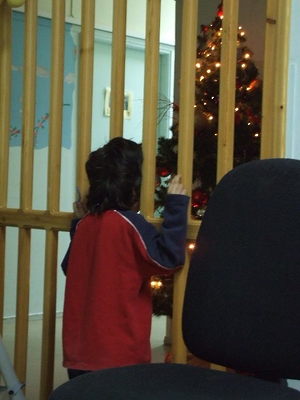Greece – No Excuse for Caging Children
EUROPE, 24 Nov 2014
Eva Cossé – Human Rights Watch
Is it acceptable for children with disabilities in institutions to be kept in caged beds because of a shortage of staff to supervise them? As shocking as it may sound, for the government of Greece the answer appears to be yes.
Last Friday [14 Nov 2014], the BBC reported on the horrific plight of children with disabilities living in the Children Care Center of Lechaina, in Southern Greece. It was not news to me.
In March 2011, the Greek Ombudsman’s Office – the national human rights institute – published a damning report on the center, noting an insufficient number of doctors and nurses, systematic sedation, and practices such as tying children and adults with developmental disabilities to their beds to reduce self-harm and the use of wooden cage beds due to staff shortages. Those with chronic diseases and disabilities in the center did not receive adequate health care and most children weren’t receiving an education.
A lack of available places in other institutions or in community care means that residents remain in the care center when they become adults and in most cases all their lives. But it’s not about enough staff or proper beds. This is about their dignity and rights. And these children should be living in community-based care, such as foster families and other alternatives to institutions.
Sadly, what’s happening in Greece is similar to the abusive practices we documented in Russian state orphanages, where staff confine many children with disabilities to cribs for days or weeks and where deinstitutionalization policies lack clear plans for implementation.
Following the Ombudsman’s report, together with the European Disability Forum, Human Rights Watch denounced the abusive conditions in the center in an open letter to the minister of health, and in submissions to UN Rights Bodies. In 2012, the UN Committee on the Rights of the Child expressed deep concern about conditions at the center and urged Greece to take steps to ensure that no child with disabilities is treated inhumanely.
It’s sad to see that more than three years after the Ombudsman’s report, the BBC story shows that conditions have barely improved at the center. Staff interviewed by the BBC said the cages are necessary to protect residents from injuring themselves. Investments are not being made into alternatives to institutions.The story has prompted the launch of a petition.
The fact that this situation is tolerated by the government is shameful. Some of the problems are linked to limited financial resources and a public sector hiring freeze mandated by Greece’s lenders, the European Union, and the International Monetary Fund. But limited resources don’t justify abusive treatment.
Greece should immediately improve the living and care conditions of all residents in the Lechaina center and similar institutions, including ending the use of caged beds, systematic sedation, and tying patients to their beds.The government needs to instead focus on de-institutionalization. And the EU and the IMF cannot stand by and watch as austerity measures condemn children to caged lives.
______________________________
Eva Cossé, Western Europe senior research assistant, works on issues related to discrimination, migration, and minority rights, with a focus on Greece. Her recent work has included research and advocacy on ethnic profiling in Greece and France, xenophobic violence in Greece, summary returns of asylum seekers and migrant children from Italy to Greece, and the unlawful detention of migrants and asylum seekers in Malta. Cossé has previous work experience from the Office of the Human Rights Commissioner of the Council of Europe. She holds a Law degree from the Université Paris 13, a master’s degree in European Law from the Université Paris 12, and a master’s degree in International Law from Université Paris 10.She is fluent in Greek, French, and English.
DISCLAIMER: The statements, views and opinions expressed in pieces republished here are solely those of the authors and do not necessarily represent those of TMS. In accordance with title 17 U.S.C. section 107, this material is distributed without profit to those who have expressed a prior interest in receiving the included information for research and educational purposes. TMS has no affiliation whatsoever with the originator of this article nor is TMS endorsed or sponsored by the originator. “GO TO ORIGINAL” links are provided as a convenience to our readers and allow for verification of authenticity. However, as originating pages are often updated by their originating host sites, the versions posted may not match the versions our readers view when clicking the “GO TO ORIGINAL” links. This site contains copyrighted material the use of which has not always been specifically authorized by the copyright owner. We are making such material available in our efforts to advance understanding of environmental, political, human rights, economic, democracy, scientific, and social justice issues, etc. We believe this constitutes a ‘fair use’ of any such copyrighted material as provided for in section 107 of the US Copyright Law. In accordance with Title 17 U.S.C. Section 107, the material on this site is distributed without profit to those who have expressed a prior interest in receiving the included information for research and educational purposes. For more information go to: http://www.law.cornell.edu/uscode/17/107.shtml. If you wish to use copyrighted material from this site for purposes of your own that go beyond ‘fair use’, you must obtain permission from the copyright owner.
